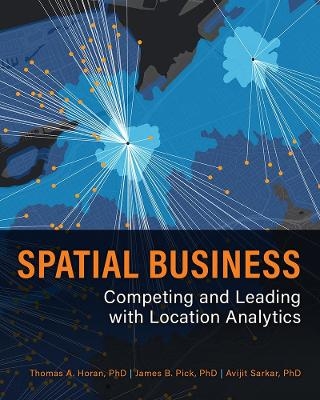
Spatial Business
Environmental Systems Research Institute Inc.,U.S. (Verlag)
978-1-58948-533-4 (ISBN)
How do companies use location intelligence to achieve competitive advantage and business success?
We live in a digital, global economy, and businesses need to know where to source, operate, and market to grow their customer base. Through location analytics and location intelligence, a business can make better-informed decisions and ultimately add value to their organization, their customers, and society. But how do businesses integrate location analytics into their business development, marketing, and operations?
Spatial Business: Competing and Leading with Location Analytics examines how location is a key factor in intelligent business decisions and achieving success. Through varied, in-depth, real-world examples, readers learn how location analytics solutions can be designed, deployed, and managed from strategic and operational perspectives.
Each chapter of Spatial Business examines how real companies have integrated location into their business intelligence and decision-making. Some key concepts include:
The fundamentals of spatial business and the technologies and methods by which businesses can understand the location value chain
The creation of spatial business architecture to facilitate location analytics in meeting business goals and needs
The themes of spatial business and implications for practice
Written by experts in spatial business and designed for managers, professionals, and students at all levels, Spatial Business provides a road map for realizing the potential of geospatial data across the entire business value chain.
Thomas A. Horan, Ph.D. is the H. Jess and Donna Senecal Chair and Dean of the School of Business & Society at the University of Redlands. He has led the School of Business & Society into a new era of business education and leadership, including the Spatial Business Initiative with Esri®. Dr. Horan has published more than 145 articles and two books. He has consulted with numerous public and private organizations, including the US Department of Transportation, United Nations Economic Development Corporation, Mayo Healthcare, and Salesforce. He has also been a Visiting Scholar at Harvard University, Massachusetts Institute of Technology, University of Hawaii, University of Minnesota, and Hong Kong University. His GIS research accomplishments have been honored on two occasions by the White House. Dr. Horan received his BA (magna cum laude, Phi Beta Kappa) from the University of Vermont and his MA and PhD from Claremont Graduate University. James Pick is professor of business in the School of Business and Society at University of Redlands. He is founding director of the Center for Spatial Business, past chair of the Department of Management and Business, past assembly chair of School of Business and Society. He is the author or co-author of 175 journal articles, book chapters, and refereed proceedings in the areas of management information systems, geographic information systems, urban studies, population, and renewable energy, and author or co-author of fourteen books. He has served as associate editor of European Journal of Information Systems and senior editor of Information Technology for Development. He has received over fifteen research and teaching awards including a senior Fulbright award for Mexico. His research has been supported by University of California, Ford Foundation, U.S. Small Business Administration, and Esri Inc. He holds a B.A. from Northwestern University, M.S. from Northern Illinois University, and Ph.D. from University of California, Irvine. Avijit Sarkar is professor of analytics and operations in the School of Business & Society at the University of Redlands. His primary research interests include equity in global digital societies, business use of GIS and location analytics, and spatial patterns of the sharing economy. His research has been supported by the US Department of Commerce and the Spatial Business Initiative (partnership between Esri and the University of Redlands). He is coauthor of the book Global Digital Divides: Explaining Change (Springer). His research has appeared in journals such as Decision Support Systems, Telecommunications Policy, Information Technology for Development, Socio-Economic Planning Sciences, European Journal of Operational Research, and Computers and Operations Research among others. He currently serves on the editorial advisory board of the Journal of Global Information Technology Management. Dr. Sarkar received his PhD and MS degrees in industrial engineering from The State University of New York (SUNY) at Buffalo.
Acknowledgments
Introduction
Part 1: Fundamentals of spatial business
Chapter 1. Fundamentals of location value
Chapter 2. Fundamentals of spatial technology
Chapter 3. Fundamentals of location analytics
Part 2: Achieving business and societal value
Chapter 4. Growing markets and customers
Chapter 5. Operating the enterprise
Chapter 6. Managing business risk and increasing resilience
Chapter 7. Enhancing corporate social responsibility
Part 3: Toward spatial excellence
Chapter 8. Business management and leadership
Chapter 9. Strategies and competitiveness
Chapter 10. Spatial business themes and implications for practice
Abbreviations
References
Index
| Erscheinungsdatum | 09.12.2022 |
|---|---|
| Zusatzinfo | Illustrations |
| Verlagsort | Redlands |
| Sprache | englisch |
| Maße | 203 x 254 mm |
| Themenwelt | Mathematik / Informatik ► Mathematik ► Finanz- / Wirtschaftsmathematik |
| Wirtschaft ► Betriebswirtschaft / Management ► Unternehmensführung / Management | |
| ISBN-10 | 1-58948-533-5 / 1589485335 |
| ISBN-13 | 978-1-58948-533-4 / 9781589485334 |
| Zustand | Neuware |
| Haben Sie eine Frage zum Produkt? |
aus dem Bereich


